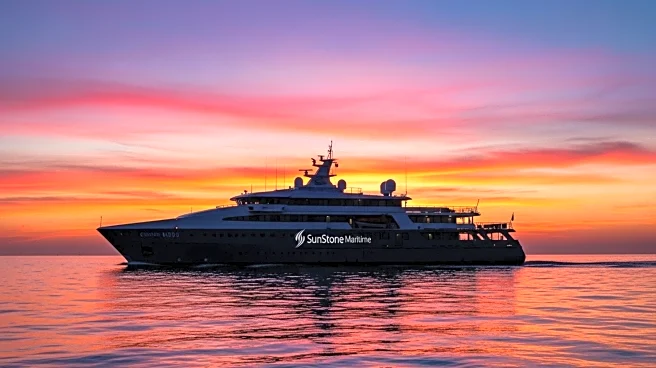What is the story about?
What's Happening?
Carsten Lund has recently assumed leadership of SunStone Maritime Group, a prominent name in the expedition cruise sector, succeeding his father Niels-Erik Lund. This transition marks the culmination of a three-year process, with Carsten and his brother Christian Lund, who serves as COO, now leading the company. Carsten Lund shared his vision for the future of SunStone Maritime, including plans to sign a shipbuilding contract for a new series of Boundless class ships by the end of the year. This development signifies a new chapter for the company, which has been a significant player in the cruise industry for over 35 years.
Why It's Important?
The leadership transition at SunStone Maritime is significant for the expedition cruise industry, as it may influence the company's strategic direction and operational focus. With Carsten Lund at the helm, the company is poised to continue its legacy while potentially expanding its fleet and enhancing its offerings. The planned Boundless class ships could introduce new technological advancements and sustainability measures, impacting the cruise sector's competitive landscape. Stakeholders, including investors and industry partners, will be closely monitoring these developments, as they could affect market dynamics and consumer choices in the cruise industry.
What's Next?
SunStone Maritime is expected to finalize a shipbuilding contract for the Boundless class ships by the end of the year. This move could lead to increased production activity and collaboration with shipbuilders, potentially influencing employment and economic activity in related sectors. The company's strategic plans may also prompt responses from competitors, who might seek to innovate or expand their own offerings to maintain market share. Additionally, the transition may lead to new partnerships or ventures aimed at enhancing SunStone Maritime's global presence and operational capabilities.
Beyond the Headlines
The transition in leadership at SunStone Maritime may have broader implications for corporate governance and succession planning within the maritime industry. As family-owned businesses navigate generational changes, they may face challenges related to maintaining legacy while adapting to modern business practices. This shift could also highlight the importance of innovation and sustainability in the cruise sector, as companies strive to meet evolving consumer expectations and regulatory requirements.

















